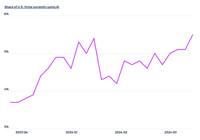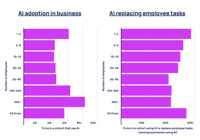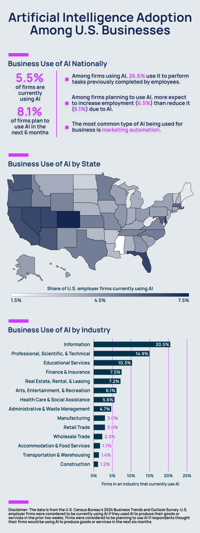The artificial intelligence boom has benefited chatbot makers, computer scientists and Nvidia investors. It’s also providing an unusual windfall for Anguilla, a tiny island in the Caribbean.
ChatGPT’s debut nearly two years ago heralded the dawn of the AI age and kicked off a digital gold rush as companies scrambled to stake their own claims by acquiring websites that end in .ai.
That’s where Anguilla comes in. The British territory was allotted control of the .ai internet address in the 1990s. It was one of hundreds of obscure top-level domains assigned to individual countries and territories based on their names. While the domains are supposed to indicate a website has a link to a particular region or language, it’s not always a requirement.
Google uses google.ai to showcase its artificial intelligence services while Elon Musk uses x.ai as the homepage for his Grok AI chatbot. Startups like AI search engine Perplexity have also snapped up .ai web addresses, redirecting users from the .com version.
Anguilla’s earnings from web domain registration fees quadrupled last year to $32 million, fueled by the surging interest in AI. The income now accounts for about 20% of Anguilla’s total government revenue. Before the AI boom, it hovered at about 5%.
Anguilla’s government, which uses the gov.ai home page, collects a fee every time a .ai web address is renewed, Identity Digital Chief Strategy Officer Ram Mohan said the fee — $140 for two years — won’t change. It also gets paid when new addresses are registered and expired ones are sold off. Some sites fetched tens of thousands of dollars.
The money directly boosts the economy of Anguilla, which is just 35 square miles and has a population of about 16,000. Blessed with coral reefs, clear waters and palm-fringed white sand beaches, the island is a haven for uber-wealthy tourists. Still, many residents are underprivileged and tourism has been battered by the pandemic and, before that, a powerful hurricane.
A ChapGPT logo is seen Dec. 6 on a smartphone in West Chester, Pa.
Anguilla doesn’t have its own AI industry, though Premier Ellis Webster hopes that one day it will become an hub for the technology. He said it was just luck that it was Anguilla, and not nearby Antigua, that was assigned the .ai domain in 1995 because both places had those letters in their names.
Webster said the money takes the pressure off government finances and helps fund key projects, but cautioned that “we can’t rely on it solely.”
“You can’t predict how long this is going to last,” Webster said in an interview with the AP. “And so I don’t want to have our economy and our country and all our programs just based on this. And then all of a sudden there’s a new fad comes up in the next year or two, and then we are left now having to make significant expenditure cuts, removing programs.”
To help keep up with the explosive growth in domain registrations, Anguilla said Tuesday it will sign a deal with a U.S.-based domain management company, Identity Digital, to help manage the effort. They said the agreement will mean more revenue for the government while improving the resilience and security of the web addresses.
Identity Digital, which also manages Australia’s .au domain, expects to migrate all .ai domain services to its systems by the start of next year, Mohan said in an interview.
A local software entrepreneur previously helped Anguilla set up its registry system decades earlier.
There are now more than 533,000 .ai web domains, an increase of more than 10-fold since 2018. The International Monetary Fund said in a May report that the earnings will help diversify the economy, “thus making it more resilient to external shocks.
Webster expects domain-related revenues to rise further, and could even double this year from last year’s $32 million.
He said the money will finance the airport’s expansion, free medical care for senior citizens and completion of a vocational technology training center at Anguilla’s high school.
The income also provides “budget support” for other projects the government is eyeing, such as a national development fund it could quickly tap for hurricane recovery efforts. The island normally relies on assistance from its administrative power, Britain, which comes with conditions, Webster said.
States Whose Businesses Are Embracing Artificial Intelligence
States Whose Businesses Are Embracing Artificial Intelligence
Updated
Oct 4, 2024

Photo Credit: Nuttapong Punna / Shutterstock
As artificial intelligence technologies have become more prevalent in the last few years, businesses everywhere are trying to understand what AI means for them.
Major tech corporations like Google, Microsoft, and OpenAI (maker of ChatGPT) have gotten headlines for driving the development and adoption of artificial intelligence, but AI has the potential to impact companies of all sizes and sectors, including small and local businesses. From automating routine tasks to improving efficiency and personalizing customer service and marketing, businesses are already identifying a variety of uses and applications for this emergent technology.
However, nationwide data shows that AI is still early in the adoption curve, and businesses in the U.S. still have a long way to go in integrating and maximizing the benefits of artificial intelligence.
Trends in AI Adoption in the Workplace
Updated
Oct 4, 2024

A small but growing share of U.S. businesses are using AI
Source: Tivly analysis of the U.S. Census Bureau’s Business Trends and Outlook Survey data
Despite all the buzz, AI adoption in business remains fairly low. According to data from the U.S. Census Bureau, only around 5.5% of businesses report that they are currently using AI in the production of goods and services. However, AI adoption has been steadily increasing and this trend is expected to continue. Just 3.7% of businesses were using AI 12 months ago, but 8.1% of firms report that they plan to use AI in the next six months.
Business Use of AI by Firm Size
Updated
Oct 4, 2024

Small businesses are more likely to use AI to replace employee tasks
Source: Tivly analysis of the U.S. Census Bureau’s Business Trends and Outlook Survey data
So far, larger businesses tend to be most likely to embrace AI technology. Among the largest firms—those with more than 250 employees—8.3% report using AI to produce their goods and services. Interestingly, however, the very smallest businesses also appear open to integrating AI into their work.
Small businesses with one to four employees have the third-highest rate of AI adoption at 6.1%. These smaller companies are also the most likely to use AI to replace employee tasks. A total of 28.5% of AI-adopting firms in this size group report doing so—the highest across all business sizes. For small business owners, AI may be an especially useful resource for completing routine but often time-consuming tasks like data entry or simple communications, allowing them to improve productivity and efficiency despite their low headcounts.
Artificial Intelligence Adoption Among U.S. Businesses
Updated
Oct 4, 2024

Source: Tivly analysis of the U.S. Census Bureau’s Business Trends and Outlook Survey data
In addition to business size, rates of AI adoption also vary by geography and industry. Firms in the South and Midwest tend to have the lowest rates of AI adoption, led by Mississippi at just 1.7% of businesses. Western states have higher rates of adoption than most of the country, with Colorado topping the U.S. at 7.4% of businesses, while select Eastern states like Florida and Delaware also rank highly.
Some of the geographic divide may be driven by industrial factors. Fields like information (20.5%); professional, scientific, and technical (14.9%); and educational services (10.3%) are most likely to use AI, and those industries are also most common in the regions of the country where AI use in business is high. The fields that use AI the least include construction, transportation and warehousing, and accommodation and food services, all of which have less than 2% of firms using AI.
The analysis was conducted by Tivly using data from the U.S. Census Bureau’s Business Trends and Outlook Survey. For the complete analysis, see States Whose Businesses Are Embracing Artificial Intelligence on Tivly.
Methodology
Updated
Oct 4, 2024

Photo Credit: Nuttapong Punna / Shutterstock
To find the states whose businesses are embracing Artificial Intelligence (AI), researchers from Tivly—a commercial insurance marketplace and services provider—used the latest data from the U.S. Census Bureau’s 2024 Business Trends and Outlook Survey. The researchers ranked states by the share of employer businesses that used AI in the production of goods or services in the previous two weeks. Some examples of AI are machine learning, natural language processing, virtual agents, and voice recognition. Researchers also calculated the share of businesses using AI to perform tasks previously done by employees (among businesses that use AI), the share of businesses planning to use AI in the next six months, the share of businesses planning to use AI to perform tasks done by employees (among businesses planning to use AI in the next six months), and the most common type of AI used among businesses. To reduce variability and to supplement the primary data fields, the latest data available from the Business Trends and Outlook Survey’s AI Supplement dataset was used for certain national and state calculations.
For complete results, see States Whose Businesses Are Embracing Artificial Intelligence on Tivly.











